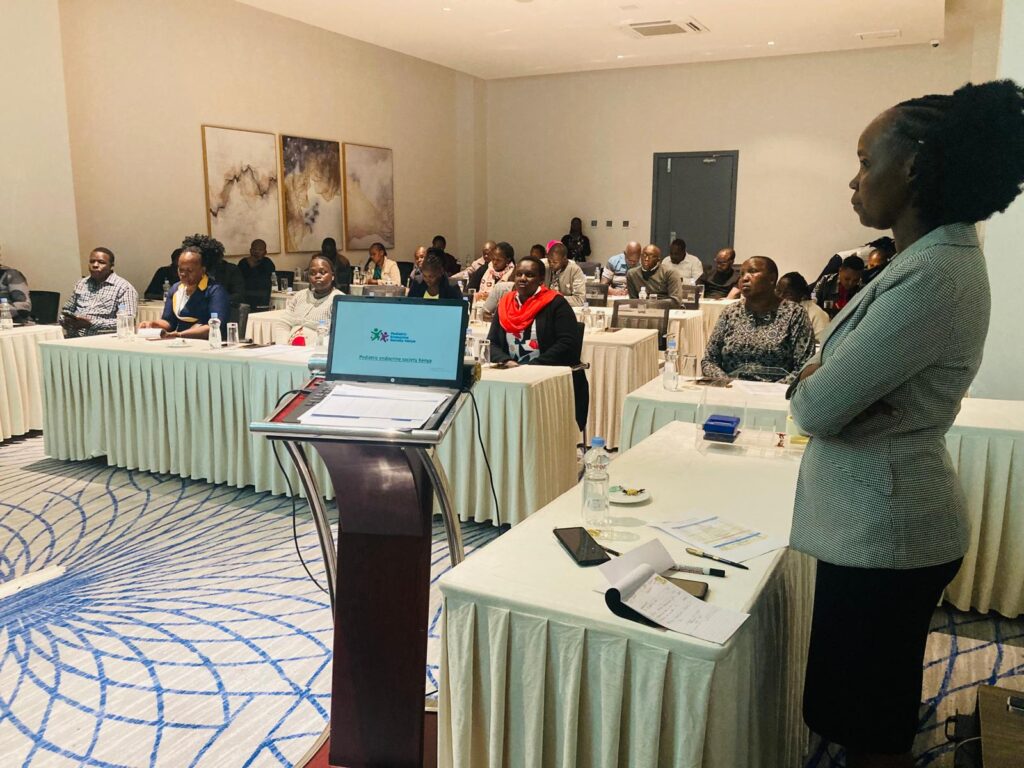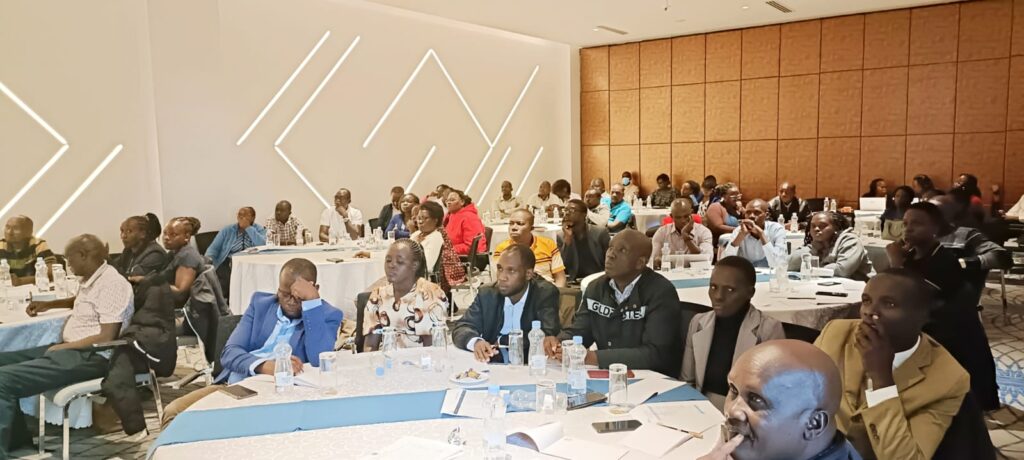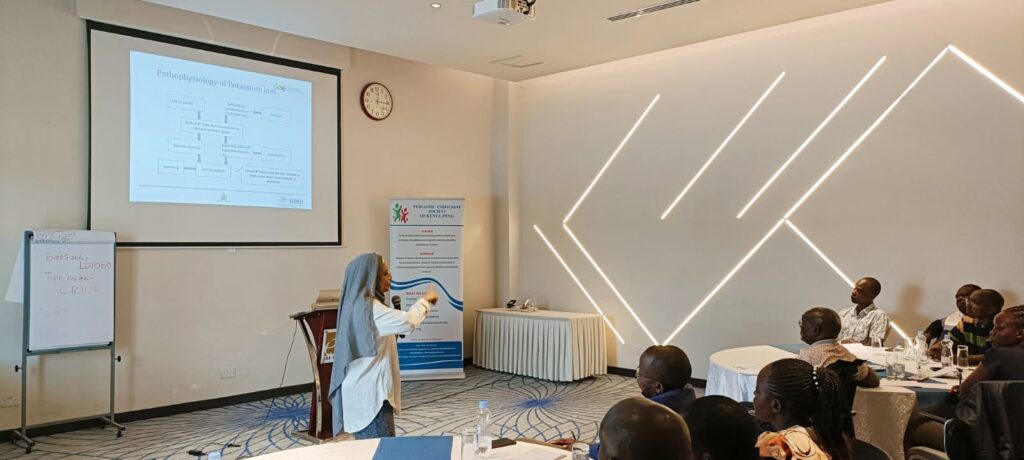Addressing Type 1 Diabetes Training Gaps in Kenya’s Healthcare Landscape - Paediatric Endocrine Society Of Kenya
- Home
- Addressing Type 1 Diabetes Training Gaps in Kenya’s Healthcare Landscape
- Posted on May 8, 2024
- Post by admin
- 21 Comments

In the scenic landscapes of Nandi, Uasin Gishu, and Elgeyo Marakwet counties in Kenya, a silent struggle persists within the healthcare system – the management of Type 1 Diabetes Mellitus (T1DM) among children. Amidst the picturesque surroundings, many children face missed diagnoses, delayed treatments, and management gaps, amplifying the burden of this chronic condition.
However, hope emerges on the horizon as the Pediatric Endocrine Society Kenya (PESK), in collaboration with the Clinton Health Access Initiative (CHAI), Ministry of Health (MOH), and the Council of Governors (CoG), steps forward to address these pressing challenges. Recognizing the critical need for targeted intervention, this collaborative effort aims to equip select healthcare workers with specialized training in T1DM management.
The initiative marks a pivotal moment in Kenya’s healthcare landscape, where awareness and capacity-building efforts converge to transform the trajectory of T1DM care. Through structured training modules, healthcare professionals are empowered with the knowledge and skills necessary for early detection, accurate diagnosis, and comprehensive management of T1DM among children.
Beyond the confines of traditional healthcare settings, community engagement initiatives foster understanding and acceptance, bridging the gap between healthcare providers and the communities they serve. By nurturing a network of informed caregivers and advocates, the initiative fosters a supportive environment conducive to holistic T1DM management.
Moreover, collaboration with governmental bodies, including the Ministry of Health and the Council of Governors, amplifies the impact of these efforts, ensuring alignment with national healthcare priorities and sustainable integration into existing healthcare frameworks.
As the sun rises over the lush landscapes of Nandi, Uasin Gishu, and Elgeyo Marakwet counties, a new dawn emerges for children living with T1DM. Through concerted efforts and unwavering dedication, the collaborative partnership spearheaded by PESK, CHAI, MOH, and CoG illuminates a path towards improved healthcare outcomes, ensuring that no child’s journey with T1DM is marred by missed opportunities or unmet needs.
In the heart of Kenya’s healthcare landscape, a beacon of hope shines bright, reminding us of the transformative power of collective action in shaping a healthier, more inclusive future for all.
Follow our Social Media
Facebook – https://web.facebook.com/profile.php?id=61556298886137
Linkedin – https://www.linkedin.com/company/paediatric-endocrine-society-kenya
Twitter – https://twitter.com/pesk_kenya



21 Replies to “Addressing Type 1 Diabetes Training Gaps in Kenya’s Healthcare Landscape”
Phoebe
Great initiative. We are optimistic that we shall find our children and adolescents with type 1 DM and out them on the right management.
Maximilla
Management of hypoglycemia in type 1 DM in children
Nightingale
I appreciate the practicality of the sessions.
Benard
It’s indeed good initiative equipping us Health care providers with knowledge on holistic care of T1Dm.
Eileen cherono
Truly appreciative of this great initiative of bridging diabetes care.
Solomon KATUIT
The cme on Dm type 1 is enlightening
Its actually addressing my knowledge gaps
Jackie
Well educative
Lilian boit
Insightful training
Different regime recommended for T1DM combination of rapid and longterm insulin
Transition of premix to basal bolus
Blood sugar,OGTT and HBA1c levels
Diagnosis and management of DKA
Identification of hypoglycaemia,hypoglycamia kit
Areas where CHAI is willing to support intervention
Lydia Kulei
I have learned management of DKA
Jacob cheruiyot
Growth and monitoring charts are crucial.
Joel suter
I have learnt of the different types of insulin’s and how to calculate dosage accordingly.
Tuwei
Very great, presenters on T1DM, the insulin to carb ratio, transitioning premix to Basal bolus the message is coming home,
Lydia Adongo
I learned the mgt of DKA and the calculations involved
Tuwei
Dear Presenters,
Your dedication to shedding light on crucial topics for those navigating Type 1 Diabetes is truly inspiring. Your insights on insulin carb ratios, DKA management, diabetes and exercise, and transitioning from premix to basal bolus are invaluable lifelines for countless individuals. Thank you for your tireless efforts in empowering and educating the T1DM community. Your passion and expertise make a profound difference in the lives of so many. Gratefully,
Tuwei
Would it be possible to share the slides from your presentation for further reference and study? Your insights are invaluable, and having access to the slides would greatly aid in reinforcing the knowledge gained during the sessions.
Winnie Saumu
Type 1 Diabetes in children and adolescents can be well controlled. By working together as a team of health care workers, we can help these children have high quality of life, free of complications. Basal bolus insulin should be embraced.
Tarsila Mamboleo
Very important training with great objective. Kindly share today’s slides
Pauline Ongaya
Learnt a lot today, how to diagnose DKA how to manage , immediate complications and also gained skills on how to administer insulin
Sarah Cherutich
I’ve learnt the management of T1DM and types of insulin and how to administer.
IMMELDAH A. ODHIAMBO
Am so glad and appreciate the management of DKA,I have developed interest and courage to manage any case on diabetes comfortably
Sharon Akinyi Nyaoro
I’m great ful for the training. It has given me awake up call to be keen in identification and diagnosis of T1DM. I can’t imagine the number of patients who have been misdiagnosed and have had poor prognosis.